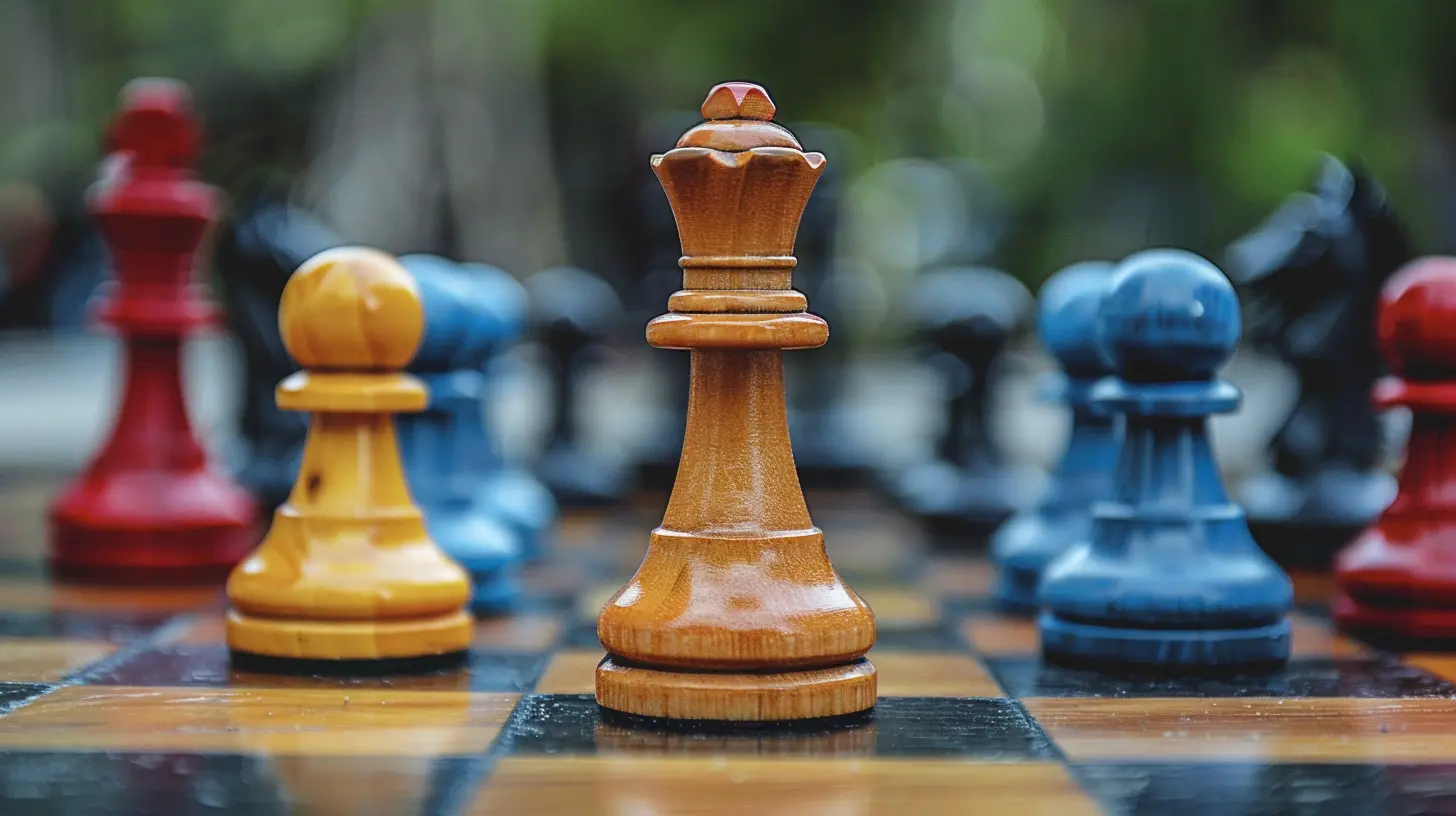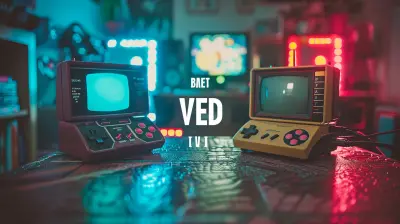How to Play Mind Games: Outthinking Your Opponent in Strategy Games
12 September 2025
They say battles aren't always won on the field but in the mind. Whether you're playing chess, plotting in Risk, or bluffing in a card game, strategy games are where intellect and wit clash in an exhilarating duel. It's not just about the moves you make, but the thoughts you plant, the traps you lay, and the confidence you exude. Strategy isn't just a skill—it's an art. So, how do you master the subtle dance of outthinking your opponent? Buckle up, because today, we're diving into the world of mind games.
The Mindset of a Master Strategist
First thing’s first—before you dive into any game, you’ve got to get your head in the right space. Strategy isn’t just about understanding the rules; it’s about embracing the psychology that comes with it. Think about it: your brain is both a weapon and a shield.Confidence: Your Most Lethal Weapon
To play mind games, you need to look confident—whether or not you're shaking in your boots inside. Confidence is like a poker face in the mental battlefield. It doesn’t matter if your strategy is falling apart behind the scenes; if they think you're unfazed, you’ve already won half the battle. Want to take it up a notch? Try faking confidence until you feel confident. Act like you've got an ace up your sleeve, and you might just convince yourself... and your opponent.Patience: The Silent Assassin
Rushing? That’s a rookie move. A true strategist embraces patience. Watch your opponent's every move, every hesitation, every breath. Sometimes, the best way to win is simply... to wait. Patience lets you spot patterns, exploit weaknesses, and strike at the perfect moment. Remember, the tortoise didn’t beat the hare by sprinting.
Outthinking Your Opponent: The Art of Subtle Manipulation
Alright, so you're calm, calculated, and radiating confidence. What next? This is where things get juicy. Let’s talk about the mind games—those sneaky, under-the-radar tactics that make your opponent second-guess everything they do.1. Planting Seeds of Doubt
One of the oldest tricks in the book? Get your opponent stuck in their own head. Make them doubt their every move. You can do this in subtle ways—raise an eyebrow like you noticed something. Let out a small chuckle after they make a move. Say something cryptic like, “Ah, bold choice!” Are you bluffing? Maybe. But it doesn’t matter. Now they’re stuck wondering if they’ve just made a huge mistake.> "The strongest prisons are the ones we build in our own minds."
When you make your opponent question themselves, you take their focus off the game and shift it to their insecurities. That’s where you win.
2. The Bluff: A Double-Edged Sword
Ah, the classic bluff. Sometimes, all it takes is a little misdirection to throw them off their game. Bluffing isn't about lying—it’s about building a narrative that leads your opponent astray. Maybe you overprotect a weak position to make it seem important or sacrifice a piece in chess to feign vulnerability.But be warned: a bluff can backfire faster than you can say "checkmate" if they call you out. Think of it as a calculated risk—a gamble where the reward could be total domination. (No pressure, right?)
3. The Power of Silence
You know what they say: silence speaks volumes. Sometimes, the best mind game move is... to do nothing at all. Don’t react. Don’t flinch. Just watch. Stare at the board, the screen, or your cards as if you’re deciphering the meaning of life. Let your opponent squirm in the unbearable silence of their own making. The tension? Palpable. The psychological pressure? Off the charts.4. Feigned Weakness: The Ultimate Trap
Got a weak spot? Or at least, does it look like you do? Sometimes the best strategy is to play the prey when you’re really the predator. Lure your opponent into attacking what they think is your Achilles’ heel. Spoiler alert: it’s a trap. Once they go all in, you spring the surprise and leave them reeling.Remember, Sun Tzu said it best: "Appear at your weakest when you are at your strongest."
Reading Minds (Not Literally, But Close)
Okay, you can’t actually read your opponent’s mind (unless… you have superpowers?). But you can read their body language, tone of voice, and behavior. Strategy games aren’t just about the pieces on the board—they’re about the person on the other side of the table.Watch for Patterns
Humans are creatures of habit. We fall into patterns without realizing it. Is your opponent always attacking on the left flank? Do they always hold back the same kind of card in Uno? Take mental notes and exploit those tendencies.Spot the Tells
Tells aren’t just for poker. Everyone has a “tell”—a tiny, subconscious quirk that gives away their thoughts. Maybe they tap their fingers when they’re nervous or glance at a specific piece they’re about to move. Train yourself to pick up on these signs, and you’ll practically have a window into their mind.Mirror Their Emotions
Here’s a fun hack: subtly mirror your opponent’s emotions or energy. If they’re calm, stay calm. If they’re frantic, amp up your intensity to throw them off. It’s like psychological judo—using their own momentum against them.
Strategizing Like a Pro: Tips for Every Game
While every game is different, there are universal strategies you can apply no matter what you’re playing. Here’s a cheat sheet to becoming a master tactician:Stay Two Steps Ahead
Don’t just think about your next move—think about the one after that, and the one after that. If you're always reacting, you’re playing their game. But when you start predicting their moves and setting traps for the future... that’s when the tables turn.Adapt Like Water
No plan survives contact with the enemy, right? If your strategy gets derailed, don’t panic. Stay flexible. Adapt. Think of it like flowing water—it doesn’t fight obstacles; it finds a way around them.Learn Their Weaknesses
Everyone has a weakness. Some players are too aggressive; others are too cautious. Identify your opponent’s Achilles’ heel and make it the cornerstone of your strategy.The Ethics of Mind Games: A Fine Line
Here’s the thing: playing mind games is fun, but it comes with responsibility. There’s a difference between outsmarting someone and outright manipulation. Be clever, but don’t be cruel. Winning is satisfying—but not at the cost of respect or friendship.Practice Makes Perfect
Here’s the truth: no one becomes a master strategist overnight. Like anything else, playing mind games and outthinking opponents takes practice. The more you play, the more you’ll learn how to read opponents, adapt to new situations, and refine your strategies.And hey, don’t get discouraged if you lose a few rounds. Every loss is a lesson. Every defeat is a step closer to becoming the kind of player opponents fear and admire in equal measure.
Wrapping It Up: Your Mind Is Your Greatest Weapon
At the end of the day, strategy games aren’t just about winning—they’re about the thrill of the battle. They’re about testing your mind, honing your skills, and diving headfirst into a mental chess match. Every player you face is a new puzzle, a new challenge, a new story waiting to unfold.So, the next time you sit down for a game, don’t just play to win. Play to outthink. Play to strategize. Play to dance that intricate, thrilling dance of minds. And remember: the sharpest weapon you have isn’t a piece on the board. It’s the brain in your skull.
all images in this post were generated using AI tools
Category:
Strategy GamesAuthor:

Audrey McGhee
Discussion
rate this article
2 comments
Paige Vance
Great article! I appreciate the insightful tips on outthinking opponents in strategy games. The importance of psychological tactics is often overlooked. Looking forward to applying these strategies in my next game! Keep up the excellent work!
December 5, 2025 at 5:36 AM

Audrey McGhee
Thank you for your kind words! I'm glad you found the tips helpful. Best of luck in your next game!
Jamie Gill
Just remember, the only strategy better than outsmarting your opponent is convincing them that they’re actually playing checkers while you’re two moves ahead in a game of chess. Game on!
September 14, 2025 at 3:46 AM

Audrey McGhee
Great analogy! Mastering perception is key to strategic success. Game on indeed!


